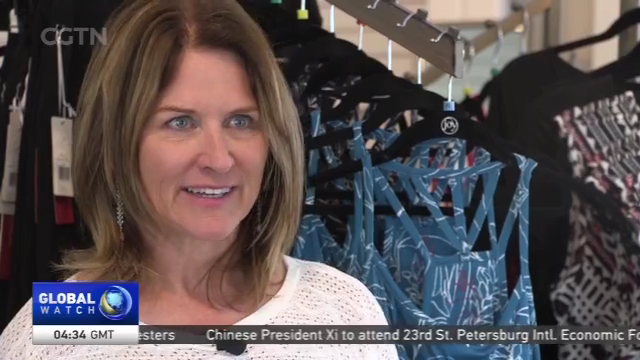
13:33, 07-Jun-2019
US-China Trade Tensions: Colorado industries caught in cross-current of frictions
Updated
00:00, 10-Jun-2019
03:02

Industries across the United States are being caught in the cross-current of trade frictions with China. And the Trump Administration has threatened to impose additional tariffs on imports from China. This could put US industries in an even more fragile position. CGTN's Hendrik Sybrandy reports from the state of Colorado.
Steve Nein has been farming and ranching for some 45 years. These are tough times on the Colorado prairie. Several years of low crop prices punctuated by a trade war, have left Nein and his fellow farmers on edge.
STEVE NEIN FARMER "You might get behind a little this year, a little more next year, well we're in about the fifth year and then with these tariffs, putting these prices lower, definitely they're concerned."
300 kilometers to the west, at a women's sportswear company called Krimson Klover.
"We specialize in knitwear, mainly sweaters, and the best knitters in the world are in China."
Founder Rhonda Swenson worries about today's tariffs and those the Trump Administration threatens to impose on China in the near future.
RHONDA SWENSON CEO, KRIMSON KLOVER "The final round is everything we do, everything. So we're reeling a little bit. It's going to be a pretty big hit."
HENDRIK SYBRANDY DENVER "Two very different lines of work. But whether it's higher prices the clothing firm pays for its products, or the lower prices the farmer gets for his crops, the U.S.-China trade dispute is making its presence felt here in the heartland."
Nein grows wheat, which some soybean farmers east of here are turning to now that China has largely stopped buying their original crop. That has a ripple effect.
STEVE NEIN FARMER "Anytime you flood one market then we're going to have lower prices and this wheat, the prices haven't hardly been breaking even on that either."
Previous tariffs increased this wholesaler's costs. A potential last round will inevitably be passed on to its 475 U.S. retailers.
RHONDA SWENSON CEO, KRIMSON KLOVER "We have to. We have to make margin. There's no way pricing isn't going up. I mean it has too. And so the end consumer will start feeling it."
Workarounds are in short supply in both places. Nein has thought about expanding his cow herd but China placed tariffs on U.S. beef.
STEVE NEIN FARMER "It did knock our cattle, our calf price down some."
Swenson has put expansion at the company on hold and is looking into using factories in countries besides China.
RHONDA SWENSON CEO, KRIMSON KLOVER "It takes us 18-24 months to bring a product to market so you can't just up and move."
Suddenly, the trade issue takes up a lot of their day.
STEVE NEIN FARMER "When one guy can just impose tariffs, that is not right because it affects millions of lives and families out here in the rural areas that voted for the guy, you know So that's a concern."
RHONDA SWENSON CEO, KRIMSON KLOVER "I don't understand how we can make such quick decisions that affect so many people in so many ways.
Whether in the city, or the country, the landscape has changed for many business people. They're now busy figuring out how they can adjust. Hendrik Sybrandy, CGTN, Denver.

SITEMAP
Copyright © 2018 CGTN. Beijing ICP prepared NO.16065310-3
Copyright © 2018 CGTN. Beijing ICP prepared NO.16065310-3